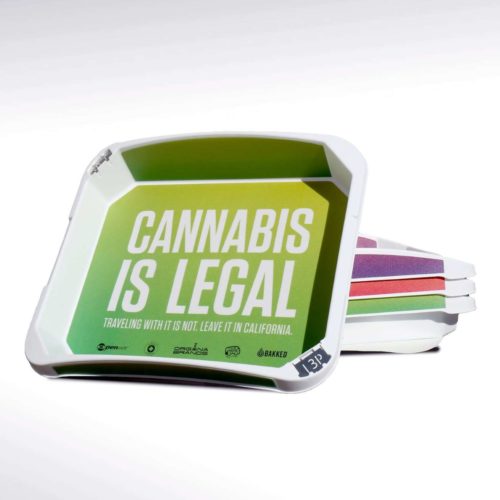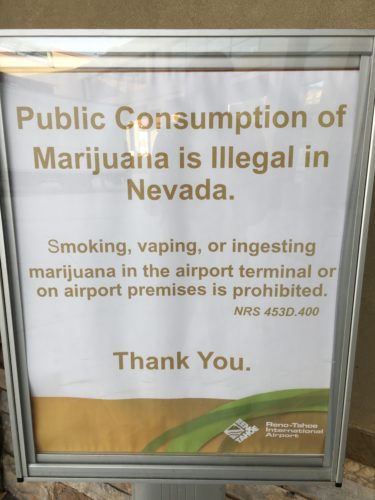
My “At the Airport” column for USA TODAY this month is all about what travelers need to consider when flying with cannabis products. Here’s the story:
In January, California joined the growing list of places where the sale of recreational marijuana is allowed and now one in five Americans lives in a state where buying pot can be a tourist activity.
But if you’re considering traveling with pot, be careful.
Marijuana is still an illegal drug under federal law and post-security areas at airports are ruled by federal agencies. So, as in Oregon, Washington, Colorado, Alaska and Nevada, bringing legally-purchased pot past a security checkpoint in the country’s most populated state can still get you into hot water.
Or maybe not.
The Transportation Security Administration says its officers remain focused on security and detecting weapons, explosives and other threats to aviation and passengers – not on sniffing out drugs. But if a TSA officer does finds marijuana or another illegal substance during the security screening of carry-on or checked baggage, the policy is to call in local airport law enforcement, said TSA spokeswoman Lorie Dankers.
“The passenger’s originating and destination airports are not taken into account,” said Dankers, “TSA’s response to the discovery of marijuana is the same in every state and at every airport – regardless of whether marijuana has been or is going to be legalized.”
But at most commercial airports in California, as in other states where possession of small amounts of recreational marijuana is now legal, once airport law enforcement steps in, nothing much usually happens.
According to the Los Angeles Airport Police, which operates at Los Angeles International Airport and several other Southern California airports, if someone is stopped by the TSA with a state-legal amount of medical of recreational marijuana, airport police would not charge them with anything, “Because it is not a crime.”
The same goes for John Wayne Airport in Orange County.
“If the TSA calls us [about finding marijuana], we’d go up and make sure it is within the legal quantity. If it is, we’d just stand by while the passenger decides what to do with it,” said Lieutenant Mark Gonzales, airport police services bureau chief with the Orange County Sheriff’s Department, “TSA may not want it to fly, but that doesn’t mean it is illegal in California.”
Gonzales says so far his team hasn’t been called to the airport checkpoint by TSA to deal with a marijuana issue. “People are reading the law and seem to know what they need to do to get through the checkpoint,” said Gonzales, “I don’t think a lot of people are risking it.”
To alert flyers to the rules about traveling with recreational pot purchased legally in California – and to advertise their cannabis company – in November Organa Brands ran an ad in the bottom of the bins at the security checkpoints at Ontario International Airport.
The message read: “Cannabis is legal. Traveling with it is not. Leave it in California.”
“We were very confident in the positive message that the trays carried,” said Organa Brands spokesman Jackson Tilley, although the company wasn’t too surprised when a month into the campaign the airport asked that the cannabis messages in the trays be removed. “If the landscape changes and cannabis ads are welcomed in airports, we’d be thrilled to run a campaign again,” said Tilley.
There are currently no marijuana-related checkpoint tray ads, signs or ‘amnesty disposal bins currently at the San Francisco, Long Beach or other California airports contacted for this story. But in Nevada, where sales of recreational marijuana became legal in July, 2017, it’s a different story.

Reno-Tahoe International Airport has a sign in its smoking area reminding travelers that marijuana use is not allowed. “In general, we have not seen a big impact from this new law at the airport,” said airport spokeswoman Heidi Jared, “However, we are closely watching other airports and how they are handling this unique situation.”
At McCarran International Airport in Las Vegas, there is a formal, airport-wide ban on possessing (or advertising) marijuana, with notices about the Clark County’s Commission’s ruling posted on the airport’s website. And, starting next month, signs about the policy and amnesty boxes for marijuana and other cannabis products will be installed at key locations at McCarran, including at the airport’s consolidated car rental facility.
“These disposal boxes will be outside of the buildings, not at the checkpoints,” said McCarran spokesman Chris Jones, “The intent being [cannabis products] are not allowable anywhere inside the buildings, be it pre or post-security.”
Meanwhile, in Colorado, which back in 2014 was the first state to license stores to sell recreational marijuana, Denver International Airport still maintains its policy of prohibiting marijuana anywhere on airport property.
“Police ask passengers found with [marijuana] to discard the drug,” said airport spokesman Heath Montgomery, “But we’ve had so few instances that we don’t track these contacts anymore.”